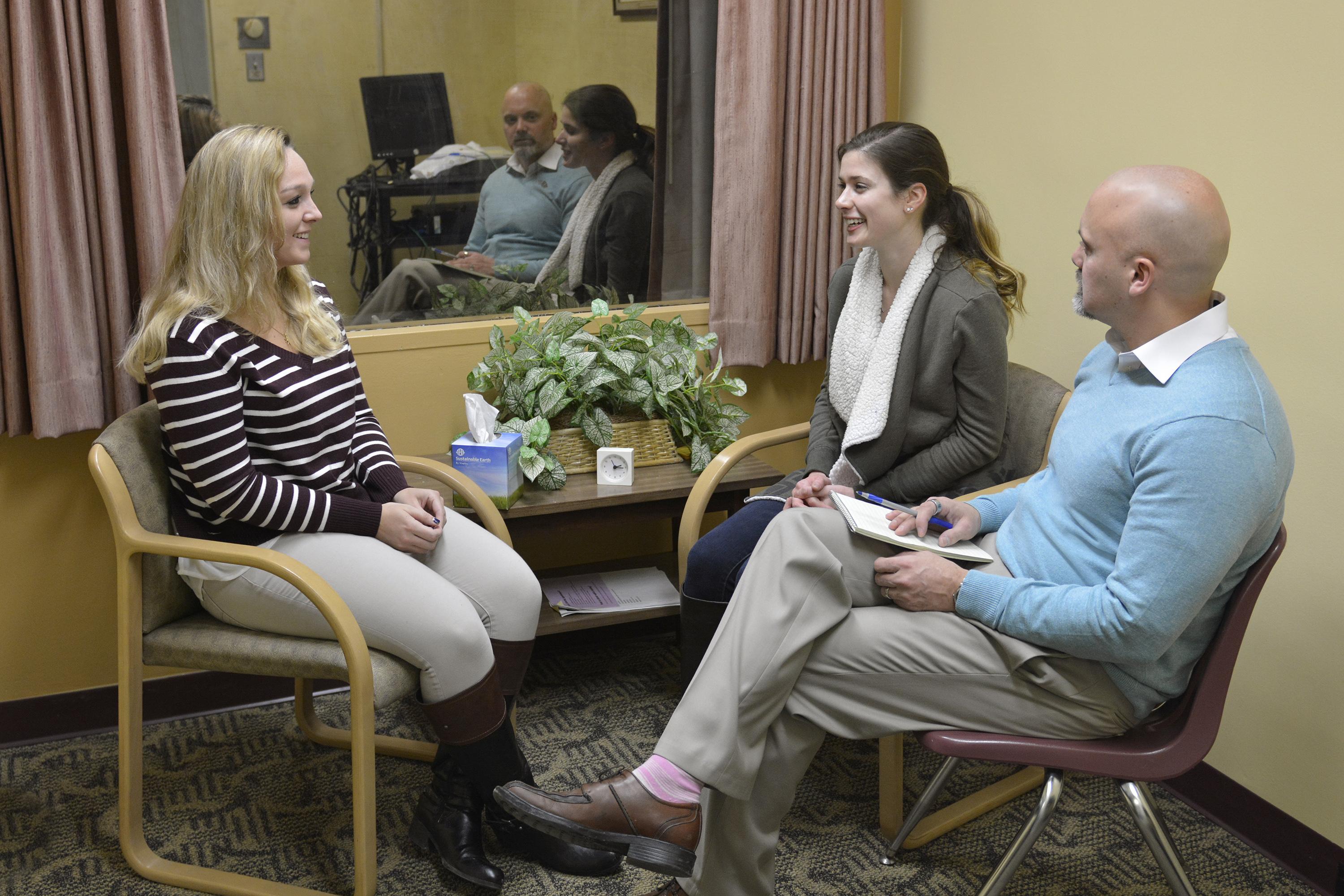Clinical practice -- Mentored by Jason Duffy (right) of the SUNY Oswego counseling and psychological services faculty, graduate students Amanda Sehres (left) and Joelle Traub participate in peer counseling in a Mahar Hall lab. The college's master's degree program in clinical mental health counseling recently earned national accreditation.
The SUNY Oswego master's degree program in clinical mental health counseling recently obtained accreditation from the discipline's standards-setting organization, and this national recognition opens new avenues of employment and other benefits for graduates.
About three years ago, the counseling and psychological services department in the college's School of Education began the rigorous self-assessment that the Council for Accreditation of Counseling and Related Programs (CACREP) requires, said department chair Michael LeBlanc.
The department measured its program against more than 150 standards the accreditor prescribes for the professional competence of graduates, then submitted its application and copious supporting research a year and half ago. CACREP made a site visit last fall. The college learned in January that the 60-credit-hour program in clinical mental health counseling had been accredited, LeBlanc said.
"The biggest thing from my perspective is that accreditation gives more opportunities for our students. There are certain jobs, especially federal jobs, that require students to graduate from a CACREP-accredited program," he said. "Additionally, a lot of our students go to work in other states, and accreditation helps with getting licensed somewhere else."
Tami Sullivan, a counseling and psychological services faculty member who serves as the department's liaison with the accrediting organization, said the CACREP designation, besides paving the way for graduates to obtain national certification in counseling, establishes standards across the country that potential employers, insurers and others recognize as "on the cutting edge of coursework and skills development."
Field experience
LeBlanc said experiential learning is a hallmark of the clinical mental health counseling program. "Each semester, students have at least one course that's almost all experiential in nature," he said. "It begins their first semester with a pre-practicum. They're in the field every semester thereafter."
Some of the numerous area employers that provide practicum and internship experiences for Oswego's degree candidates are the Child Advocacy Center, Cayuga Counseling Services and Crouse Hospital.
"I'm currently at Integrative Counseling Services (for practicum)," said second-semester graduate student Allison Meyers, who was delighted to hear about the accreditation in terms of her future job prospects. "The great thing about that is there are four different offices: Oswego, Fulton, Cicero and Auburn. It's awesome."
Meyers also noted the high level of quality, depth of experience and commitment among the faculty in the program.
"Something I look for that's important is how involved the faculty are in the field," Meyers said. "Having professors that are active -- who take clients and do counseling on a regular basis and then teach us -- is so beneficial and so amazing. They know how to relate to people on a one-to-one basis, so you feel heard and understood and safe."
Meyers said she hopes to earn her license for mental health counseling and to practice privately; she also wants to be a registered play therapist. The college offers graduate certificates in play therapy, trauma studies and behavioral forensics, as well as a certificate of advanced studies in school counseling.
Oswego's program also offers students frequent opportunities to present research at regional conferences and across the state and nation, said Sullivan, a counselor-educator who has a statewide perspective as president of the New York Association for Counselor Education and Supervision. She said that at SUNY Oswego, students' skills development and coursework go hand-in-hand.
"There's a lot of emphasis on the self as counselor," Sullivan said. "There's a lot of work on yourself -- we place emphasis in our program on professional disposition. So our students are getting feedback from the first course to the last course, not only on their academic perspective but also on their development as persons. That's all we are when we go into a counseling relationship with a client -- it's just you."
Graduate students in clinical mental health counseling may choose to take classes at SUNY Oswego in Syracuse or on the main campus, LeBlanc said.
For more information on clinical mental health counseling and related degree and certificate programs at SUNY Oswego, visit http://oswego.edu/cps, email cps@oswego.edu or call 315-312-4051.




